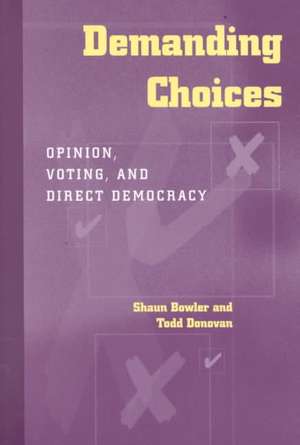Demanding Choices: Opinion, Voting, and Direct Democracy
Autor Shaun Bowler, Todd Andrew Donovanen Limba Engleză Paperback – 21 dec 2000
Referenda on important public policy questions have come to play a central role in policy making in many states. Referenda, or ballot propositions, have resulted in limits on taxation and limits on the number of terms of elected officials, and have dealt with bilingual education, campaign finances, and affirmative action, in states all over the country.
Shaun Bowler and Todd Donovan present a searching and original examination of how voters make decisions in direct referenda. The authors ask if voters have some information about the issue easily at their disposal and if they make choices that seem sensible given their interests and the information they have. Looking at the way voters respond to different kinds of questions, the authors suggest that while direct democracy has its failings, the flaws do not necessarily lie with citizens being "duped," nor with voters approving propositions they do not want or do not understand at some basic level.
As cynicism about government has increased many have sought to take policy questions out of the hands of elected officials and put the questions directly before the voters for decision. And yet many are skeptical about the ability of voters to make intelligent decisions about complex policy issues. This important book demonstrates that voters are capable of responding thoughtfully to referenda questions.
This book will appeal to students of contemporary American politics and electoral politics.
Shaun Bowler is Associate Professor of Political Science, University of California at Irvine. Todd Donovan is Associate Professor of Political Science, Western Washington University.
Shaun Bowler and Todd Donovan present a searching and original examination of how voters make decisions in direct referenda. The authors ask if voters have some information about the issue easily at their disposal and if they make choices that seem sensible given their interests and the information they have. Looking at the way voters respond to different kinds of questions, the authors suggest that while direct democracy has its failings, the flaws do not necessarily lie with citizens being "duped," nor with voters approving propositions they do not want or do not understand at some basic level.
As cynicism about government has increased many have sought to take policy questions out of the hands of elected officials and put the questions directly before the voters for decision. And yet many are skeptical about the ability of voters to make intelligent decisions about complex policy issues. This important book demonstrates that voters are capable of responding thoughtfully to referenda questions.
This book will appeal to students of contemporary American politics and electoral politics.
Shaun Bowler is Associate Professor of Political Science, University of California at Irvine. Todd Donovan is Associate Professor of Political Science, Western Washington University.
Preț: 203.10 lei
Nou
Puncte Express: 305
Preț estimativ în valută:
38.87€ • 40.33$ • 32.49£
38.87€ • 40.33$ • 32.49£
Carte indisponibilă temporar
Doresc să fiu notificat când acest titlu va fi disponibil:
Se trimite...
Preluare comenzi: 021 569.72.76
Specificații
ISBN-13: 9780472087150
ISBN-10: 0472087150
Pagini: 216
Ilustrații: 1 figure, 31 tables
Dimensiuni: 152 x 229 x 13 mm
Greutate: 0.31 kg
Editura: UNIVERSITY OF MICHIGAN PRESS
Colecția University of Michigan Press
ISBN-10: 0472087150
Pagini: 216
Ilustrații: 1 figure, 31 tables
Dimensiuni: 152 x 229 x 13 mm
Greutate: 0.31 kg
Editura: UNIVERSITY OF MICHIGAN PRESS
Colecția University of Michigan Press
Notă biografică
Shaun Bowler is Professor of Political Science at the University of California, Riverside.
Todd Donovan is Associate Professor of Political Science, Western Washington University.
Todd Donovan is Associate Professor of Political Science, Western Washington University.
Descriere
Referenda are becoming a more common way to resolve heated political questions. This book shows how voters make choices in referenda
